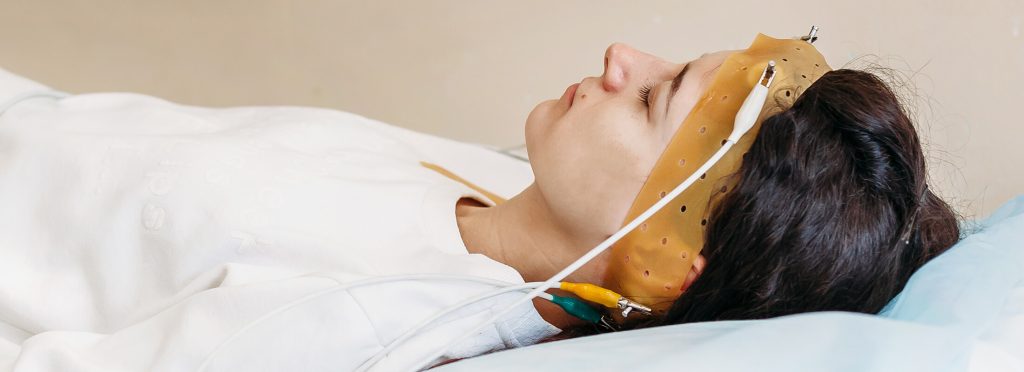Overview
Sleep Studies
Crawford County Memorial Hospital has been providing sleep studies for around a decade. A sleep study is conducted during an overnight stay at the hospital. Special rooms resembling bedrooms are equipped with queen-sized beds, TV, carpeted floor, and private bathrooms. A physician’s referral is necessary.
A patient having a sleep study generally arrives at the hospital around 8 p.m. with the testing usually complete by 6 a.m. or earlier. A technician hooks wires to the patient’s head – this measures brain waves and sleep stages. They also have wires on a patient’s chest to measure breathing and heart activity, on the abdomen to monitor respiratory effort, and on the patient’s legs to monitor leg twitches. Technicians will also monitor a patient’s oxygen level and eye movement. Patients can remain mobile with the wires on and are able to get out of bed to use the restroom in during the night.
CCMH contracts with a sleep study agency called Practical Sleep Services. The studies are performed by licensed technicians from this agency who work in collaboration with the hospital and staff to ensure these studies are carried out properly.
Patients are monitored at all times during the night. Cameras and microphones are set up in the patient room that are monitored by a technician stationed in a nearby lab. Along with that, the technician is watching the results of the brain, heart, and breathing effort activity. After the study is complete, all of the results are analyzed and sent back to the physician who ordered the test.
Sleep studies are ordered by physicians to confirm a diagnosis of sleep apnea.
To learn more about the Cardiopulmonary services offered at CCMH, call 712.265.2666.

What is Sleep Apnea?
Sleep apnea is very common – in fact more than 18 million American adults suffer from it. Apnea is a term that is used to describe a condition when people stop breathing. When a person has sleep apnea, the airway becomes blocked repeatedly during their sleep. Their breathing temporarily stops.
Signs of Sleep Apnea
- Loud snoring
- Person alternates between snoring very loudly and being very quiet
- Observed pauses in breathing during sleep
- Excessive sleepiness
- He/she may fall asleep while watching TV or reading, attending
- meetings or driving
- Person may wake up tired, even after a full night of sleep
- Morning headaches
- Trouble concentrating or forgetfulness
- Frequent nighttime awakenings and urination
- Irritability / short temper / lack of energy / depression or other mood changes
- Restlessness at night – sufferer may toss and turn a lot
- Dry mouth
Causes of Sleep Apnea
Sleep apnea occurs when the muscles in the back of the throat fail to keep the airway open despite your efforts to breathe. Even though this seems like a simple problem, it can cause other bigger health concerns. In addition to interrupting sleep, the pauses in breathing can cause blood oxygen levels to drop and can cause changes in heart rate, and blood pressure. These occurrences can increase your risk of high blood pressure, heart attack and stroke.
Treatments
If the study shows you do have sleep apnea, there are several treatment options. The most common one is a c-pap – continuous positive airway pressure. This treatment involves wearing a mask that supplies a continuous pressure through the nose during sleep. The mask helps prevent airway restriction or collapse. This can bring an end to snoring, gasping and interrupted sleep.
In addition, losing weight, sleeping on your side, and eliminating the use of alcohol and tobacco can decrease the severity of sleep apnea.
STOP BANG
Self Screening
-
Snoring
Do you snore loud enough to be heard through a closed door?
-
Tiredness
Do you have excessive daytime sleepiness or feel tired when waking?
-
Observed
Have you been told you stop breathing at night or gag?
-
Pressure
Are you taking medication for high blood pressure?
-
Body Mass Index
Do you have a BMI more than 35 kg/m2?
-
Age
Are you over 50 years of age?
-
Neck
Is your neck circumference greater than 16 inches (40 cm)?
-
Gender
Are you male?
If you answered “Yes” to 5 to 8 of these questions, you are at high risk of suffering from sleep apnea.
If you answered “Yes” to 3 or 4 of these questions, you are at intermediate risk of sleep apnea.
If you answered “Yes” to 0 to 2 of these questions, you are at low risk for sleep apnea.